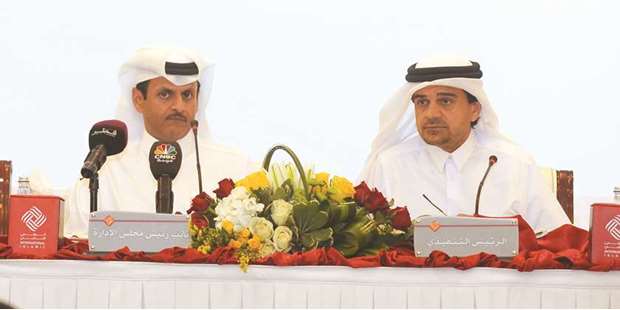QIIB’s close collaboration with the country’s “various economic sectors” has helped it consolidate its position as a leading bank capable of maintaining stable constant growth, achieving the best returns for its shareholders and providing the best services and benefits for its customers, said vice-chairman Sheikh Abdullah bin Thani bin Abdullah al-Thani.
He was addressing QIIB shareholders at their annual general meeting at the Ezdan Tower in Doha yesterday.
During the past year, Sheikh Abdullah said QIIB was capable of achieving growth in the most important financial indicators such as financial, deposits and asset portfolios, among others, thus helping the bank maintain its high ratings assigned to it by global credit rating agencies. “This reflects the regulated implementation of the bank’s interim plans and strategy and our ability to benefit from the strength of the Qatari economy, which is considered as the strongest and best-performing in the region and the most capable of confronting the markets’ fluctuations and challenges imposed by the external developments, which experts and specialists have testified,” he said.
With regard to the QIIB’s overseas expansion plans, the vice-chairman said the bank meticulously examines any available opportunity and conduct feasibility studies, especially in terms of risks. QIIB was able to open the first Islamic bank in the Kingdom of Morocco — Umnia — in partnership with local partners after receiving all the required licenses for practising Islamic banking activities.
QIIB’s 2017 financial results show that the total assets increased by 9.6% and the deposits have seen an increase by 21% in comparison with the previous year. The shareholders’ equity stood at QR6.8bn in end-2017, which denotes a growth of 2.1%, the revenues increased to QR1.866bn, which represents an increase of 8.8% in comparison with 2016. QIIB’s net profit for the fiscal 2017 amounted to QR832mn, which shows a growth rate of 6% compared to QR784.7mn in 2016. The return on equity was QR5.50 per share for the fiscal 2017 compared to QR5.18 per share in 2016.
In his remarks, QIIB chief executive officer Dr Abdulbasit Ahmad al-Shaibei said during 2017, the “QIIB performance was good and in line with the bank’s growth trajectory, since its incorporation more than a quarter of a century ago, whether in terms of the growth rates, expansion of the customer base or other main financial indicators.” He said the strength of the Qatari economy and its ability to overcome all the obstacles and challenges have mainly contributed to shielding the local banking sector from the ill-effects of the blockade.
The government measures have turned the blockade into an opportunity and have contributed to achieving financial stability of the banking sector and helped overcome any consequences of the blockade, al-Shaibei said. The growth figures for the various items provisioned in the QIIB budget confirmed these facts.
“During 2017, we focused on the local market; in particular the opportunities offered by the Qatari economy. Qatar has witnessed a major growth in the implementation of various projects, whether they are big projects related to infrastructures or small and medium enterprises (SMEs), which receive the government’s special attention in view of their importance in our economy,” the CEO noted.
For the purpose of strengthening the bank’s financial position and diversifying the funding sources, QIIB established a $2bn sukuk issuance programme.
“We have received the approval of the Financial Conduct Authority (FCA) in the United Kingdom to list it on the London Stock Exchange at a later time. It is worth noting that the sukuk programme was assigned a provisional rating of ‘A2’ by Moody’s Investors Service and expected ‘A’ rating by Fitch Ratings,” he added.

Sheikh Abdullah and al-Shaibei: Maintaining stable constant growth. PICTURE: Shameer Rashid

